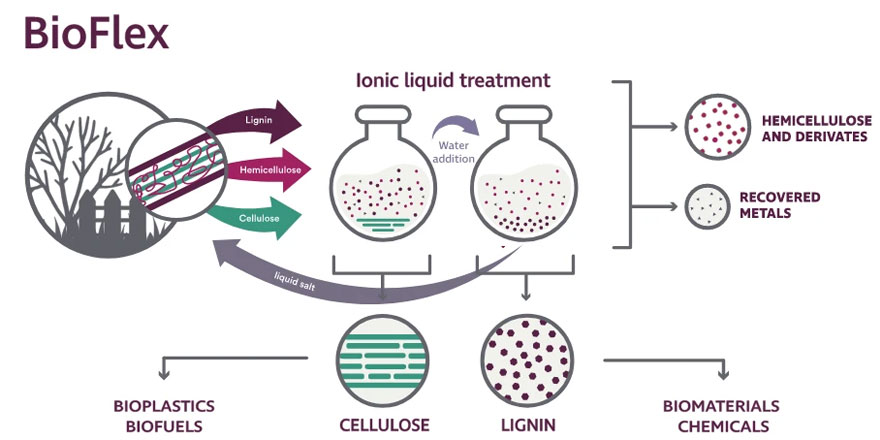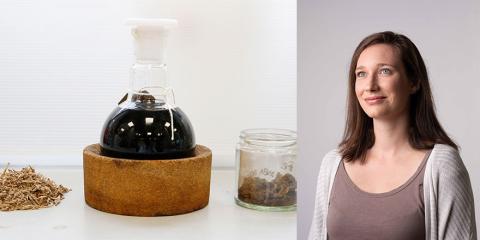Turning waste wood into fuels with Chrysalix Technologies

Chrysalix Technologies turns contaminated waste wood into the chemicals, materials and fuels of a cleaner tomorrow.
The final episode of the BBC’s Blue Planet II brought the full extent of human activity on marine life into view, as millions listened to Sir David Attenborough delivering a powerful and moving rallying cry to humanity to step up our efforts and protect the planet.
The message provoked a tremendous response from around the world, with corporations, governments and individuals urged to do more to stop so much waste entering our environment. It’s a challenge that Florence Gschwend, co-founder and Director of Operations at Chrysalix Technologies, supported by EIT Climate-KIC, hopes to tackle head on.
The company, which won the 2017 EIT Change Award at INNOVEIT, has had a busy time since their award, including receiving support from the H2020 SuperBIO program to help scale up work with a couple of industrial partners. We caught up with Florence Gschwend to find out more.
Turning waste into money
The company’s technology uses a process known as BioFlex to turn contaminated waste wood into fuels, materials and chemicals. It’s a process that Gschwend first began working on five years ago as part of her PhD studies at Imperial College London, and it’s a solution to an issue that is very much a passion for the Chrysalix team.
The problem we're trying to solve is a really large problem, and as an individual it can be hard to grasp. We don't necessarily think about where the plastic in our bottles comes from or what happens to our waste afterwards, but the Blue Planet has helped to change that level of awareness.
Florence Gschwend, founder Chrysalix Technologies
While David Attenborough very much pushed the environmental and social benefits of being more conscious of the full lifecycle of the products we use, Gschwend believes that there have to be clear financial incentives for changing the way we think and behave.
Bioflex process products & Florence Gschwend
Making financial sense
The reality is that people don't tend to pay more just because something is green and sustainable. If you want to make a big impact and replace existing products with a more sustainable alternative, then it needs to make financial sense.The fact that we can use unwanted waste that people currently pay for disposal gives us a real advantage. It means that we can produce an alternative to oil, which is already very cheap, that isn't necessarily more expensive.
Florence Gschwend, founder Chrysalix Technologies
The fact that consumers are demanding change certainly helps to push both the private and state sectors towards more sustainable behaviour. It underlines the complexities in getting to market, for although the Chrysalix customer are other businesses, they are nonetheless influenced by wider changes in public opinion.
Finding the right contacts at these companies is something that EIT Climate-KIC has helped Chrysalix with; membership of the EIT Innovation Community also providing a real ‘stamp of approval’ that helps to prove to these businesses that they are reputable and can be relied upon to do good work.
Stepping into the market
Since receiving their award at INNOVEIT, Chrysalix have received funding from the H2020 SuperBIO programme to conduct scale up work with a couple of industrial partners. This has seen them work with a big Swedish paper producer and a German company that produces thermoplastics to test BioFlex in production-like facilities.
The company, which officially incorporated in 2017, has come a long way in a short space of time, and while there is still much to be done, it’s a journey that has been hugely enjoyable for Gschwend, who even finds the setbacks something to be cherished and learned from.
At the end of the day, it's really important to make those mistakes and learn from them. Even though there are moments that weren't fruitful, overall there is very little I would change, and it's really important to embrace mistakes and learn from them.
Florence Gschwend, founder Chrysalix Technologies
She believes that scientists should not be afraid of creating a start-up. She says that running a start-up is itself a very scientific process, in that you're constantly running experiments and validating that against your hypothesis. The only difference is that these experiments are conducted with real people rather than cell cultures and so on in a laboratory.
Want to know more about Chrysalix Technologies?
Look at our Chrysalix Technologies factsheet Read our success story on Chrysalix Technologies



 Share this page
Share this page


